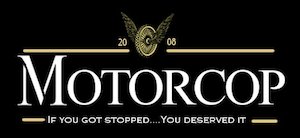Interview with Motorcop, Police Officer in California
Motorcop (MC) is the pseudonym of a police officer from the Great State of California. He is the author of the popular police blog, Motorcop. As the title implies, MC is a motorcycle cop and has been for over two decades. His blog posting offers up scores of tales from the saddle, and many of his own beliefs as well. In this enlightening interview, MC touches upon a wide range of experiences from the inside of the California police culture.
Why did you decide to become a police officer?
 I grew up with a firefighter for a dad, so civil service has always been in my blood. It wasn’t until I was a police dispatcher in college, though, that I really felt the call. On a graveyard shift, I handled a date rape call in which the victim was able to get away from the suspect and call for help. I was the only dispatcher on duty. I had units with her in less than a minute and units with the suspect about two minutes after that. At that particular moment in time, I was the only person on the planet that was able to help the victim. It was an incredible feeling and I wanted more. A few years later, after graduation, I applied to be a police officer and was hired. That was fifteen years ago.
I grew up with a firefighter for a dad, so civil service has always been in my blood. It wasn’t until I was a police dispatcher in college, though, that I really felt the call. On a graveyard shift, I handled a date rape call in which the victim was able to get away from the suspect and call for help. I was the only dispatcher on duty. I had units with her in less than a minute and units with the suspect about two minutes after that. At that particular moment in time, I was the only person on the planet that was able to help the victim. It was an incredible feeling and I wanted more. A few years later, after graduation, I applied to be a police officer and was hired. That was fifteen years ago.
What are some guidelines you would suggest for a new officer recruit?
Don’t be a hypocrite. That means adhere to the laws, both penal and vehicle, that you are called to enforce.
Remember you are human and can’t solve the world’s ills. The people you, for one reason or other, are unable to cite and/or arrest, will be caught at some point. It’s a virtual guarantee.
For those just entering the law enforcement field, what advice would you give? What challenges might they face?
Study, study, study. Flashcards are your friend. Go on as many ride-a-longs you can. Learn to be a leader. The public will look to you for leadership…and so will your partners.
You will be tempted to take shortcuts. Do. Not. Take. Them. You will dishonor yourself, your department, and the rest of us. Do your job to its completion and to the best of your ability.
What is one interesting case that you worked and how did your role in it help deliver a positive outcome?
As a motor officer, I am also a collision reconstructionist. I have over 600 hours of collision investigation. I can tell you the speed of a vehicle based on a number of factors: how far the pedestrian flew when the vehicle hit him/her, tire friction marks, the amount of damage to a vehicle, etc.
I have been the lead investigator on a number of fatal collisions. The most recent involved the death of a 17-year-old male. Sadly, part of my role was to attend the autopsy. It was not my first and I don’t anticipate it being my last. One of the hardest parts of my job is compartmentalizing the emotions in dealing with tragedy.
That being said, however, I am part of a stellar team and using all of our experiences, we were able to confirm the vehicle’s speed at well over twice the speed limit. Fatal collisions are very time-intensive, so three weeks was taken up by the investigation; however, it led to a filing with the District Attorney for a charge of vehicular manslaughter.
Give us your best advice for someone just starting their career in law enforcement.
Pay attention. To everything around you. All the time. Watch hands. Watch how your training officer and fellow officers do things. Be as safe as you can.
Slow down. Remember, just like shooting, slow is smooth and smooth is fast. Wear your seatbelt and stay off the phone. I don’t care if you’re “exempt” or not. Don’t be stupid.
How have recent advances in technology improved the field of law enforcement?
The use of social media has changed the face of law enforcement. It has increased the ability for departments and individual officer to both relate and interact with the community for whom they work. We can’t do our jobs if the community has lost its trust in us. social media goes well beyond simple community relations, though. It has increased our ability to communicate with other officers as well as to pursue investigations.
What do you consider your biggest strength as a police officer?
My greatest strength is my integrity. I’ve never had a complaint of misconduct upheld, nor have I ever had to worry about what to say or do because I always try to do what is right. I am, however, human and when mistakes are made, I take responsibility for my actions.
We are so quick to point out the mistakes of others and demand people are responsible for themselves, but too slow to do so ourselves.
We sincerely thank Motorcop for taking the time to share these valuable insights with our readers.
